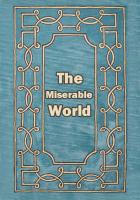Instructions, concurred in by both Houses, to draw up a Bill which should effect a particular purpose, would be imperative on the Commissioners, unless they preferred to resign their office. Once framed, however, Parliament should have no power to alter the measure, but solely to pass or reject it; or, if partially disapproved of, remit it to the Commission for reconsideration. The Commissioners should be appointed by the Crown, but should hold their offices for a time certain, say five years, unless removed on an address from the two Houses of Parliament, grounded either on personal misconduct (as in the case of judges), or on refusal to draw up a Bill in obedience to the demands of Parliament. At the expiration of the five years a member should cease to hold office unless reappointed, in order to provide a convenient mode of getting rid of those who had not been found equal to their duties, and of infusing new and younger blood into the body.
The necessity of some provision corresponding to this was felt even in the Athenian Democracy, where, in the time of its most complete ascendancy, the popular Ecclesia could pass Psephisms (mostly decrees on single matters of policy), but laws, so called, could only be made or altered by a different and less numerous body, renewed annually, called the Nomothetae, whose duty it also was to revise the whole of the laws, and keep them consistent with one another. In the English Constitution there is great difficulty in introducing any arrangement which is new both in form and in substance, but comparatively little repugnance is felt to the attainment of new purposes by an adaptation of existing forms and traditions.
It appears to me that the means might be devised of enriching the Constitution with this great improvement through the machinery of the House of Lords. A Commission for preparing Bills would in itself be no more an innovation on the Constitution than the Board for the administration of the Poor Laws, or the Inclosure Commission. If, in consideration of the great importance and dignity of the trust, it were made a rule that every person appointed a member of the Legislative Commission, unless removed from office on an address from Parliament, should be a Peer for life, it is probable that the same good sense and taste which leave the judicial functions of the Peerage practically to the exclusive care of the law lords, would leave the business of legislation, except on questions involving political principles and interests, to the professional legislators; that Bills originating in the Upper House would always be drawn up by them; that the Government would devolve on them the framing of all its Bills; and that private members of the House of Commons would gradually find it convenient, and likely to facilitate the passing of their measures through the two Houses, if instead of bringing in a Bill and submitting it directly to the House, they obtained leave to introduce it and have it referred to the Legislative Commission. For it would, of course, be open to the House to refer for the consideration of that body not a subject merely, but any specific proposal, or a Draft of a Bill in extenso, when any member thought himself capable of preparing one such as ought to pass; and the House would doubtless refer every such draft to the Commission, if only as materials, and for the benefit of the suggestions it might contain: as they would, in like manner, refer every amendment or objection which might be proposed in writing by any member of the House after a measure had left the Commissioners' hands. The alteration of Bills by a Committee of the whole House would cease, not by formal abolition, but by desuetude; the right not being abandoned, but laid up in the same armoury with the royal veto, the right of withholding the supplies, and other ancient instruments of political warfare, which no one desires to see used, but no one likes to part with, lest they should any time be found to be still needed in an extraordinary emergency. By such arrangements as these, legislation would assume its proper place as a work of skilled labour and special study and experience; while the most important liberty of the nation, that of being governed only by laws assented to by its elected representatives, would be fully preserved, and made more valuable by being detached from the serious, but by no means unavoidable, drawbacks which now accompany it in the form of ignorant and ill-considered legislation.















